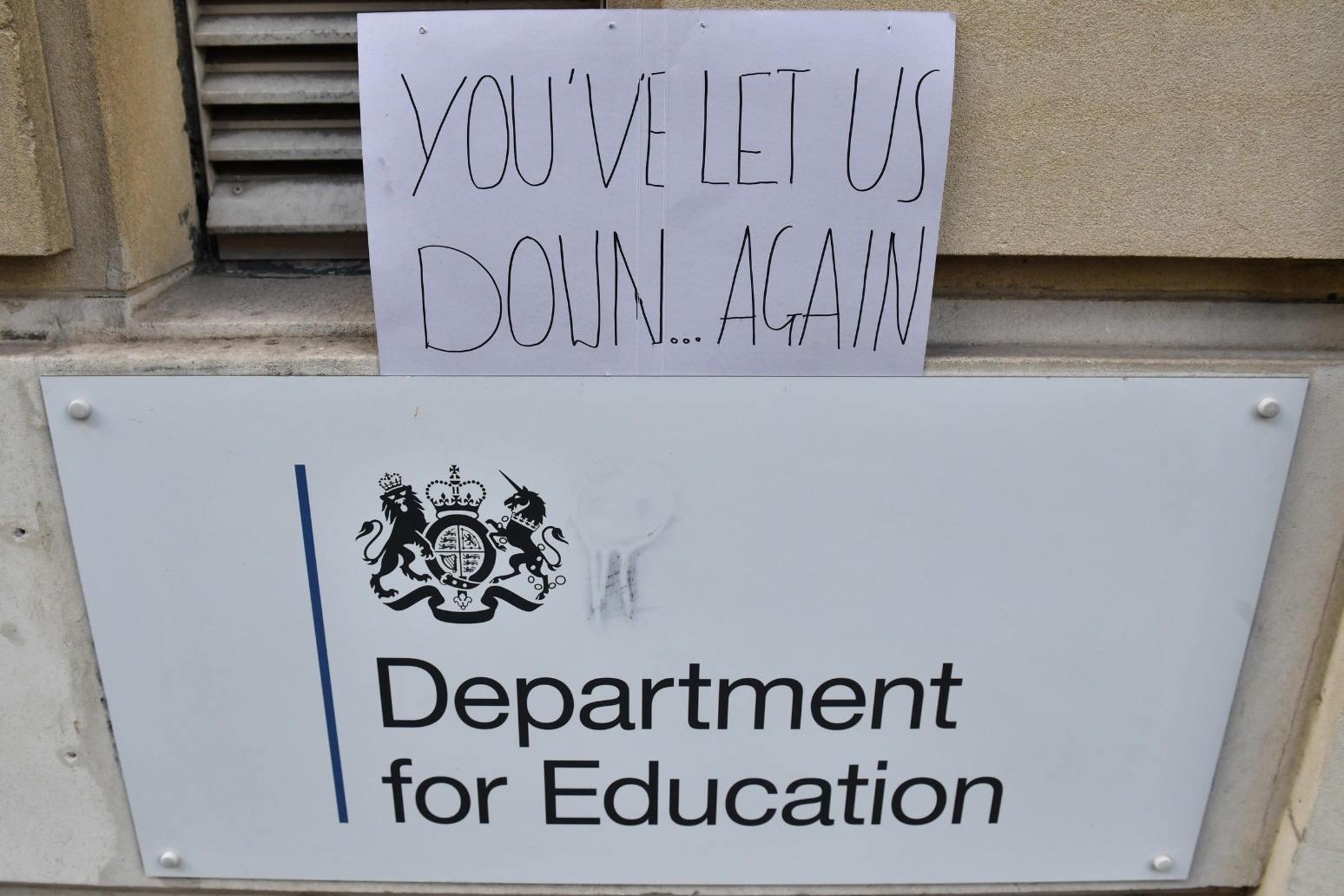
GCSE results based on teacher assessments
Hundreds of thousands of students are receiving their GCSE results following a U-turn on grading.
Btec pupils will have to wait for their grades amid last-minute changes.
Teenagers in England, Wales and Northern Ireland will be awarded their final results, the higher of either their teachers’ estimated grade or the moderated grade, after exams were cancelled.
It follows the announcement that GCSE and A-level students would be able to receive grades based on assessments by schools or colleges, rather than an algorithm, after thousands of A-level results were downgraded last week.
Btec grades were not included in the original U-turn, but on Wednesday – with just hours to go until results day – Pearson said it would regrade Btecs to “address concerns about unfairness”.
The exam board told schools and colleges not to publish level 1 and 2 results in the vocational qualifications on Thursday to give them more time to recalculate the grades.
It is still unclear what the appeals process will be for GCSE and A-level students who are unhappy with their results following the U-turn.
But England’s exams regulator previously said individual pupils would not be allowed to challenge teacher-assessed grades.
Geoff Barton, general secretary of the Association of School and College Leaders (ASCL), is expecting staff to have “challenging” conversations with GCSE students unhappy with results.
He said one sixth form college was threatened with a solicitor and had to deal with “abusive” parents” after “all hell broke loose” over the colleges’ estimated grades for A-levels last week.
Speaking to the PA news agency, Mr Barton said: “That will be repeated tomorrow I guess.
“I think people are expecting difficult conversations.
“It will be around a misunderstanding of ‘This is an individual teacher.
“‘She didn’t like me. She has therefore marked me down.’”
Overall, this year more students are expected to receive higher GCSE grades than in previous years, Mr Barton said.
He added: “This is because schools may, understandably, have given some students the benefit of the doubt when they are on the borderline between two grades and they had the capability to achieve the higher grade.”
Colleges are urgently calling for more funding from the Government to cope with a likely surge of pupils who will be able to meet entry requirements for sixth form colleges amid the U-turn.
Some colleges are already at maximum capacity and there is a limit to the number of pupils they can admit amid the Covid-19 pandemic, the Sixth Form Colleges Association (SFCA) said.
James Kewin, deputy chief executive of the SFCA, told PA: “In many respects, the immediate challenges faced by sixth form colleges mirror those faced by universities, increased demand for places combined with pressure on space because of Covid restrictions.”
Last year, one in five entries (20.7%) in England picked up at least a 7 or an A grade, and around two thirds (67.1%) of entries in England were awarded at least grade 4, or C.
An analysis from the FFT Education Datalab research unit has suggested that disadvantaged pupils could benefit this year as the attainment gap could narrow amid the U-turn.
Lower-attaining schools appear to have submitted the most generous grades in their teacher assessment, the researchers said.
It added: “It’s possible that we’ll see less of a discrepancy between the improvement in results recorded by independent schools, and by state schools.”
Traditional A*-G grades have been scrapped and replaced with a 9-1 system amid reforms, with 9 the highest result. A 4 is broadly equivalent to a C grade, and a 7 broadly equivalent to an A.
Students receiving GCSE results this summer will get numerical grades for all their subjects as all courses have now moved over to the new grading system.
Education Secretary Gavin Williamson said: “I know how difficult this year has been for students due to the coronavirus outbreak, having to be out of the classroom and away from their friends.”
He added: “Students can now look forward to exciting opportunities, this year they have a choice of studying our pioneering T levels, or they can do A-levels, take up an apprenticeship, or choose from a range of other vocational qualifications.”
Published: by Radio NewsHub